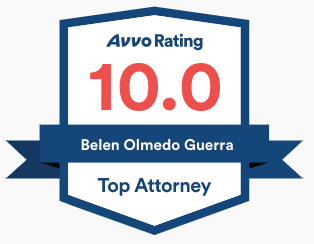If an Arizona court has charged your child with felony drug charges, you need an attorney.
When it comes to felony drug charges for a juvenile, the key is to keep the case in juvenile court. Arizona prosecutors and judges prosecute drug charges with severity. If your child is near their eighteenth birthday, a prosecutor may fight to try the case in an adult court.
In this post, Phoenix Juvenile defense attorney Belen Olmedo Guerra will answer your questions about felony drug charges for a juvenile in Arizona. Belen has extensive experience with juvenile cases in Arizona and understands how juvenile charges can affect the child and their family negatively. We will also talk about legal defenses to felony drug charges.
What is the Difference Between Adult and Juvenile Felony Drug Charges?
A minor who commits a crime in Arizona is subject to Arizona’s juvenile court system.
A juvenile court is similar to an adult court. But juvenile courts may focus more on rehabilitation than punishment and incarceration. The goal of a juvenile court should be to guide the child towards being a productive and successful member of society.
But that changes if your child is close to their eighteenth birthday. A prosecutor may lobby for an adult court to try an older teenager, especially if the offense is particularly severe.
For instance, if a seventeen-year-old commits an offense that would result in a Arizona felony charge in an adult court, a prosecutor can ask to charge that child as an adult.
The most common juvenile drug charge is the possession of drugs. If a court charges your child as an adult, possession is almost always a felony. But if your child’s case remains in juvenile court, there are plenty of options aside from felony drug charges. We’ll talk more about that below, in the Penalties section.
What is Juvenile Possession of Drugs?
Possession is when a juvenile knowingly possesses and controls a controlled or illegal substance. They must possess a controlled or illegal substance without any legal justification.
Charges like these can arise after a traffic stop if a police officer suspects there is marijuana or some other drug in the car. If the police officer finds drugs or drug paraphernalia in the car, a court can charge that juvenile with possession.
Possession charges often involve drugs like methamphetamines, marijuana, and similar drugs. But an Arizona court can also charge juveniles with possession if they possess prescription drugs if they do not have a prescription.
For example, a juvenile is not guilty of possession if they have a bottle of Oxycontin their doctor prescribed to them. But if their friend takes a few pills from the bottle, the friend is then guilty of possession.
What is Juvenile Knowledge of Drugs?
As we mentioned above, a juvenile must knowingly possess illegal drugs for an Arizona court to charge them with possession. If your attorney can prove that your child did not knowingly possess the drugs, that is usually enough to avoid a conviction.
But simply saying that you did not know about the drugs is not enough. Sometimes circumstances are enough to convince a juvenile court that there was no knowledge of the drugs.
For example, if the police find marijuana in your child’s backpack, the circumstances of that situation will probably be enough to convince a court your child knew the drugs were there. And again, if your child is an older teenager there is a chance a prosecutor would try them as an adult, and they could end up with felony drug charges.
What is Juvenile Control of Drugs?
Another factor of juvenile possession is control of the illegal substance.
To convict a juvenile of possession, a prosecutor must prove the juvenile was actually controlling the drugs. This often involves proving the juvenile was holding the drugs or had them in a pocket or a backpack. It is often enough for a prosecutor to show that the juvenile had control of the area where police discovered the drugs.
For example, if police find drugs in a juvenile’s car, the fact that it is their car is enough to establish control. This is also the case with school lockers and bedrooms.
What are the Penalties for Juvenile Drug Possession?
Anytime a court charges a juvenile with possession, there are potentially serious consequences. Depending on the drug in question, if your child faces adult felony drug charges, they could be looking at anything from prison time to heavy fines.
Juvenile courts in Arizona have a somewhat wider range of options than adult courts. This can leave many people wondering what to expect in juvenile court. Some of the possible penalties for drug possession in juvenile court are:
Drug Counseling
Juvenile courts focus on rehabilitating young people. Because of this, a juvenile court can order the juvenile offender to attend drug counseling. Arizona courts can also order the juvenile’s parents to attend drug counseling.
Probation
An Arizona court can place a juvenile on probation for drug possession. When a court orders probation, your child will have to comply with some specific terms.
For example, the terms of probation will probably include attending school regularly. Your child might also have to maintain a job, or find one if they are old enough. They might have to participate in drug counseling or community service.
The court can also order your child to report regularly to a juvenile probation officer. Probation lasts at least six months, but longer terms are also possible.
Diversion
Diversion is a common penalty for juvenile drug charges. The juvenile in question will have to comply with certain court rules, just like with probation.
The difference is that the juvenile can complete diversion orders without going before juvenile court. If the juvenile successfully completes the diversion program, the courts will essentially dismiss the charges. This option is usually available for first-time offenders only.
Detention
In very rare cases, detention is the penalty for juvenile drug charges. Detention may be home confinement or placement with a relative or foster home. This is usually the case for juveniles who are repeat offenders, or in cases where drug possession is the result of robbery or violent crime.
What Are Some Legal Defenses for Juvenile Drug Charges?
There are plenty of viable legal defenses for felony drug charges, adult or juvenile. Some of these viable defenses are:
- Lack of knowledge
- Illegal search
- Valid prescription
- Religious purposes
Contact the Belen Law Firm to Get a Top Phoenix Juvenile Defense Attorney On Your Side
If your child is facing possession charges in Arizona, call an experienced Phoenix criminal defense lawyer at the Belen Law Firm. You can contact us by calling 602-715-0908, or by filling out the form on our website. From there, we can schedule a free and confidential initial consultation.





















